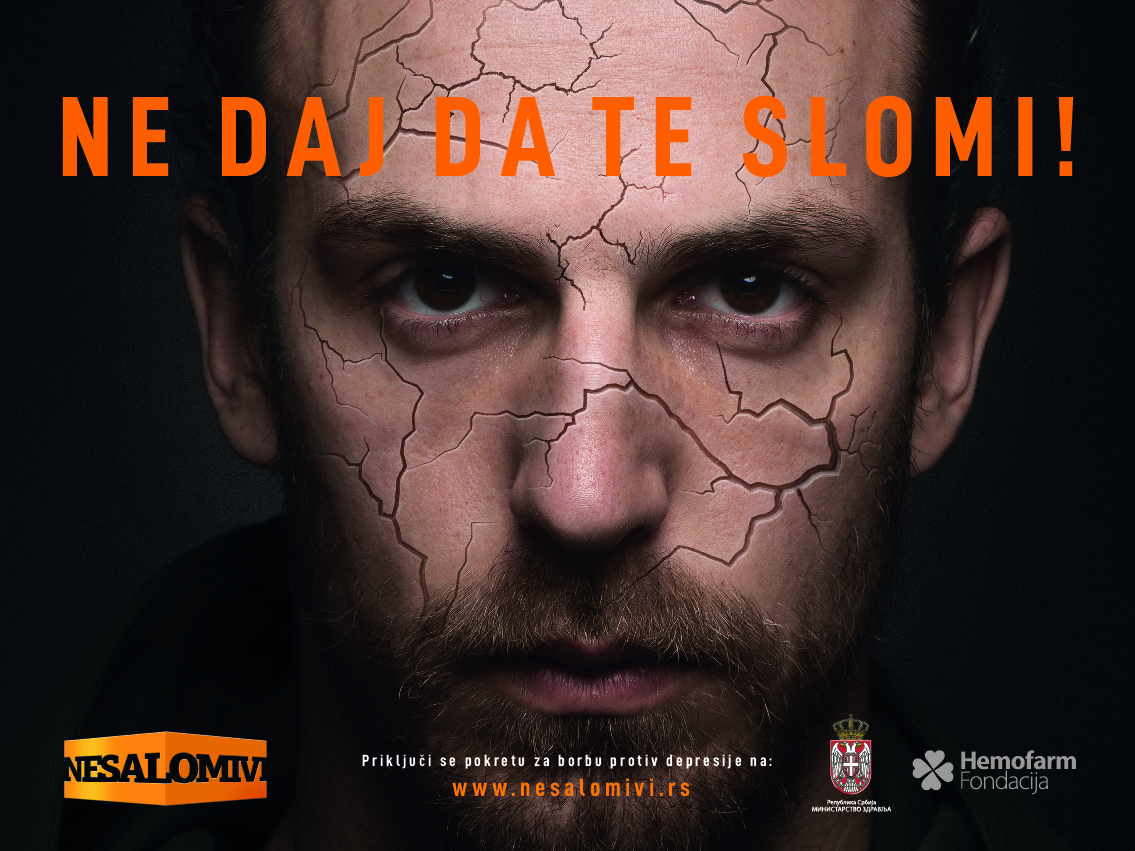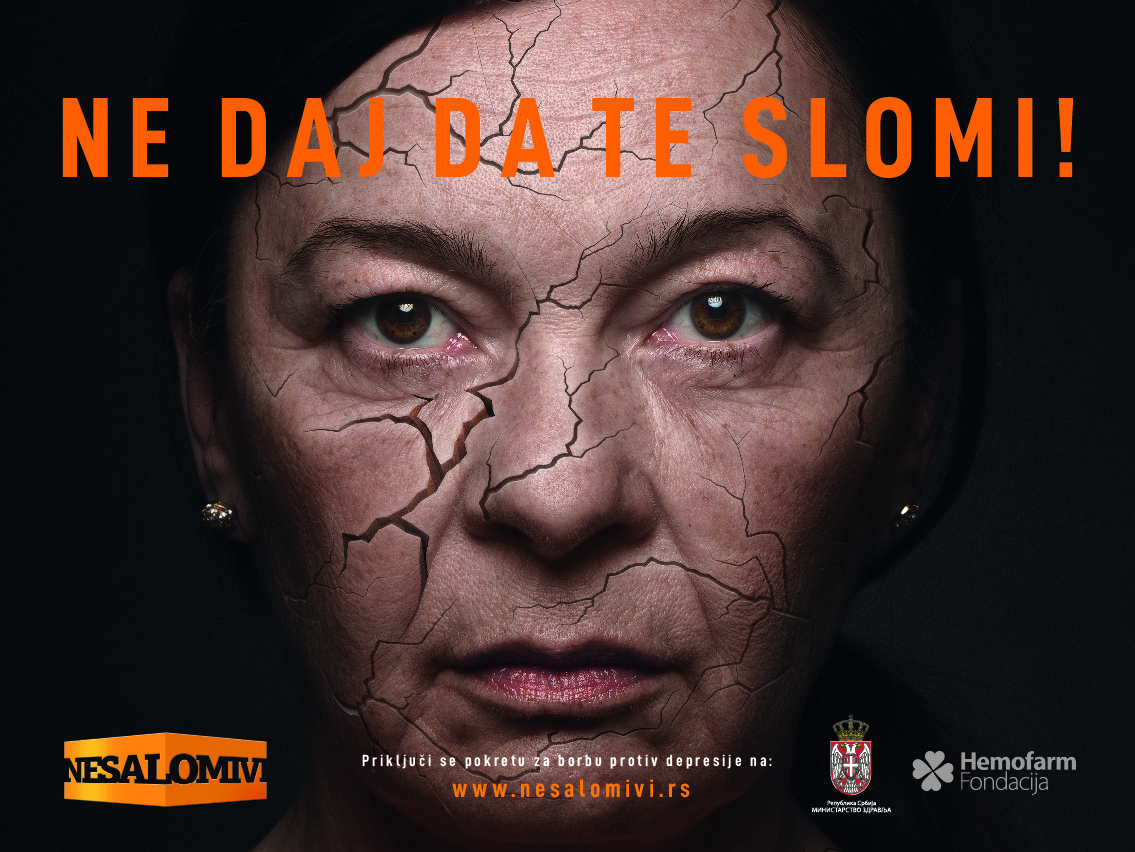We have a new source of stress and new problems every day, which can be about business, finance, interpersonal relationships. The burden presses us and keeps us convinced that we are in a circle, which we cannot get out of, and that it is not as difficult for anyone as it is for us. And it goes on and on until we meet people whose life problems and temptations are much greater – people who suffer from depression and who have decided to speak up publicly despite the stigma that accompanies people with mental illness in Serbia.

Endangered mental health entails a whole spectrum of discrimination from ‘it’s no big deal’ to ‘he/she is not normal’, and such a living, daily file in the community fills up much faster than the medical one. This file is often more important to a person for his/her life than the one in the medical record, because the way you will feel depends on the people in the immediate environment as well as whether they will let you back among the ‘normal’ in case you say you have a mental disorder and need support.
Sisyphus of our time – The strongest people in the world
People with symptoms of depression are Sisyphus of our time because they carry a burden every day that exceeds their capabilities. They carry it persistently until they collapse under its weight because 200 kilograms lifted in the gym is nothing compared to the mental burden. Such people are, at the same time, also the strongest people in the world because they carry their fear, worry and pain continuously without giving up the struggle. That is why their stories are important, we should hear them, understand that it can happen to us, and be aware that the help and support of the closest to us, as well as experts, are important on the way to recovery.
Jovana Gligorijević has written and talked a lot about her life experience with depression and panic disorder. ‘More than the ones who love me think I should have, but quite enough to be proud of me at the same time’ Jovana Gligorijević, a journalist with the weekly ‘Time’, says.
Her story has a happy ending essentially but she has admitted publicly that she was being treated for depression and her panic attacks and anxiety were a part of daily routine, which has taken its toll.
The strongest people in the world: Jovana Gligorijević
In December 2013, I got the right diagnosis and the wrong therapy. In October 2014, I realized that this therapy didn’t really work. In January 2015, I changed a psychiatrist. As of July 2017, I am a person who no longer needs antidepressants.
As a bitter residue of depression, I am still burdened with a huge amount of anxiety, but it has been empirically determined that my worst fears and scenarios spinning in my head come true in exactly 0 percent of cases. And so, I shake a little, I choke a little, but it’s important that I’m alive and kicking!
I have to make a short flashback here: I have been going to psychotherapy since 2011. Yes, it wasn’t until 2013 that this ‘something’ turned out to have its own name and code starting with F, but it’s obvious that even two years earlier I realized I needed help.
The healing started the moment I decided to beat and squash my depression
My story is, essentially, the one with a happy ending, so I’ll start with the latter: what was the cost of my publicly admitting that I was being treated for depression and that panic attacks and anxiety were part of my daily routine …
I think that my healing commenced the moment I decided to beat and squash depression. I devoutly took therapy, borrowed money for psychotherapy, read everything I could get my hands on, and I thought it could help me (including the New Testament, although I am not a religious person).
The book that helped me most, and I will keep the reasons to myself because they are too personal, is Viktor Frankl’s book ‘Why Didn’t You Kill Yourself?’.
Already cured, provoked by the way the local media reported on one suicide, I wrote a text the title of which was a paraphrase of V. Frankl: ‘Why Didn’t I Kill Myself?’. The text itself deals with the fact that suicide has never been an option for me, because I had every support one can imagine, including also a set of happy circumstances.
The title, however, cost me dearly. Even though I’m a journalist, even though I’m an editor, I ignored the fact that most people don’t read beyond the title, I overestimated readers thinking everyone had heard of Frankl’s book.
In the eyes of one part of the public, who did not move beyond the title, I am still a suicidal woman who ‘should not live above the first floor’, ‘is always with one foot on the edge of a roof’, ‘blackmails editors by threatening to kill herself’ and, the only thing that really worries me: ‘a person who has admitted that she is mentally ill, so she should not be invited to comment on domestic politics, and her texts should not be read, because she is not sane’.

Stigmatization affects me a little, but it scares me a lot
Let’s be clear: I would have retired from my job a long time ago if this affected me a lot. It affects me a little, but it scares me a lot. Not for my own sake, but because I know how many people follow me on social media because they have problems similar to mine.
It scares me, because I’ve made it, but many are still struggling and I don’t know how they are affected by the messages of those who have no justification in the form of a diagnosis, because prejudice and malice are not a diagnosis, but a matter of character.
Serbia is also a society of paradoxes, so it happens that I get the worst insults about my mental condition from a public figure who also spoke publicly about going to a psychiatrist and undergoing pharmacotherapy.
And, how did I realize this in a, conditionally speaking, nicer way? In a way that my inboxes are full, and when I say full, I mean thousands of messages from those who have no one (except their psychiatrist) to say how they feel. They lack understanding by the environment or hide well that they feel bad (you would be surprised how we, people with depression, act well and how we know how to be funny and ‘always smiling’).
There are thousands of such messages, but I will remember one forever: ‘I read your text yesterday and decided to come home from work anyway. I hated you yesterday, and today I am grateful to you because my children still have a mother.’
Depression is treatable. Talking about the disease is a part of healing. Let’s not silence the people around us, let’s better learn how to listen to them.
SOS line for fight against depression
If you are sad, lonely, apathetic, have a sense of lack of personal quality, you are depressed, call the SOS number 0800 001 002 for fighting depression. Calls are free of charge, and the SOS line is available 24 hours a day, 7 days a week. Experts, psychologists and psychiatrists of the Special Hospitals for Psychiatric Diseases in Vršac, Gornja Toponica, Kovin and Novi Kneževac are available on the SOS line. Help and support are available also via e-mail [email protected]. Texts and expert advice on the improvement of psycho-social health, confessions of people who are struggling with depression, most frequently asked questions and answers about depression, as well as tips for overcoming the disease are available on the website www.nesalomivi.rs of the campaign ‘Unbreakable’ for fighting depression and stigma that accompanies patients, which has been launched by Hemofarm Foundation in cooperation with the Faculty of Philosophy, University of Belgrade and with the support of the Serbian Ministry of Health.
When we are together, nothing can break us
Join the anti-depression movement ‘Unbreakable’ at www.nesalomivi.rs.
